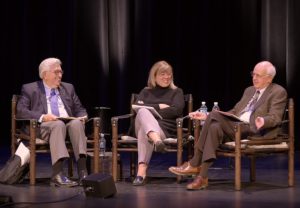

The Mahaiwe Theatre’s 690 seats sold out in what seemed like no time when it was announced that Wendell Berry would be speaking there last October. The Great Barrington, Mass., theater is at the cultural heart of the Berkshires and hosts (alongside live theater and music, movies, lectures, and community events) the annual E.F. Schumacher Lecture, a series of thoughtful talks on economic and environmental issues. This latest of which is now available to view online, a gift for those of us who were unable to attend in person like me.
Berry and his colleague Wes Jackson were there to deliver the 2016 lecture – 36 years after presenting the very first Schumacher Lecture. And Berry was characteristically thought-provoking in his analysis of our perilous state. “What screwed us up,” he said, “was oceanic navigation, because it taught us to think that if we didn’t have it here we could get it somewhere else.”
The Kentucky-based Berry is a farmer who has written extensively not only about his experiences with farming and a community-based philosophy, but also has proven himself a keen cultural critic as well as a distinguished poet and novelist. “That has made us infantile in a way,” he continued, “a bunch of grown-up children. One of my teachers once said, ‘People are never worth a damn as long as they’ve got two choices.’ I think that’s profound.” As the audience laughed uncomfortably, he continued, “What it means is that when you don’t have a choice, you make the best you can of what you’ve got. Commitment is the removal of the extra choices.”
Jackson added his own gloss to the solution, stressing the need for community-based action. “If we don’t have a cultural cycle taken care of,” he said, “then the fertility cycle will remain part of the modern extractive cycle.” Jackson co-founded the Land Institute in 1976, an organization that pursues practical pathways to sustainable agriculture, including the development of perennial crops to replace the annuals that now dominate farmlands.
A few years ago, he and Berry crafted the 50-Years Farm Bill, which calls for a reversal of the current practice of putting 80 percent of farmland into annual crops. “We took it to D.C. in 2009 and it didn’t go anywhere,” said Jackson, despite a plea in a New York Times op-ed piece (1/4/2009) by the two of them that noted, in part, “Industrial agricultural has made our food supply entirely dependent on fossil fuels and, by substituting technological ‘solutions’ for human work and care, has virtually destroyed the cultures of husbandry (imperfect as they may have been) once indigenous to family farms and farming neighborhoods.”
“Since then,” said Jackson, “we’ve been working to develop perennial grains.” Three of the Land Institute scientists have determined why such grains were too difficult for our ancestors to cultivate. “Annuals can accept their own pollen, but perennials tend to outcross, so the mutational load builds up. It’s why humans outcross. If you don’t outcross, you end up with something like the pharaohs and some of the problems of the royalties of Europe.” Jackson, himself a geneticist, explained, “We know how to purge that genetic load, partly because of our modern computational power, and also because of our greater understanding of the molecular basis of genetics.”
Testimony to the advantage of perennial ground cover are several hundred acres growing in northern Iowa and southern Minnesota, as well as growing associated with the Hudson Valley Farm Hub in New York. “Internationally, we’re supporting the perennialization of rice in China. But,” he concluded, “we need to up the ante.” He’d like to return the 50-Years Farm Bill to Congress. “We want to help this become a cultural phenomenon.”
“The importance of the 50-Years Farm Bill,” said Berry, “is that it proposes to bring agriculture back in line with the laws of nature.” His observations echo Jackson’s, but with a dry sense of whimsy added: “Perennials hold fertilizer in place,” he said. “Nature loves perennials. To her, annuals are Band-Aids. Perennials are her skin, her pelt. Nature is a great dame, but she’s very stern. And she has no court of appeals. What’s gone down the river is gone. All we have to work with is what’s left.”
Berry and Jackson both stressed that the solutions they propose require as much of a cultural shift as they do a technological one. “Industrialism is failing,” said Berry, “very visibly. Agriculture is failing, too, because it proposes and tolerates no limits.” Two centuries ago in the midwest, he noted, there was a mill situated every twelve miles, so that a farmer was always a day’s round-trip from a mill. “Back then, we accepted the limits of the horse. Now we accept no limits, and we do the most we can with everything we do, which is either explosive or toxic.”
The talk was moderated by Mary Berry, Wendell’s daughter, herself the founding executive director of the Berry Center, an organization seeking to bridge the cultural and economic gaps between urban and rural areas. “Where we live,” she said, referring to her home in Kentucky, “farmers are in a state of emergency. I tend to speak to largely urban audiences, who ask why the farmers don’t just take up local production for local markets.” This question, suggesting an easy solution, ignores the economics of modern farming, and underscores the “cultural divide between urban and rural places,” she said, adding, “Reconnection must take place – the local food movement has been going on for something like forty years, but the divide has gotten wider.”
Jackson’s answer is to change the educational curricula “in such a way as uses liberal arts to speak to these problems.” The perception of farming, he lamented, is still based on the assumptions of the 1750s. “What would a curriculum look like that encourages people to go back home, dig in, and be there long enough for affection to grow and intelligent action to take place to address what is needed in that community?”
Getting to the heart of the evening’s topic, he went on, is to ask what it means to live within limits. “We can’t get politicians to deal with these questions, so we need to develop a constituency that can deal with these problems.” The ultimate question, he said, is, “How do we meet bona fide human needs in a no-growth economy?”
“To put it in practical terms,” said Wendell, “to the very ground underfoot – the earth’s places are unimaginably diverse. No two places on earth are alike. And any little field will reveal itself as a composite of even smaller places. To treat this as if it were all uniform is like applying a cookie-cutter to a wad of dough – you don’t get the sensitivity, you don’t get the artistry that’s necessary for the good of the land.”
Echoing the thrust of his essay ‘In Distrust of Movements’ (Orion Magazine, 2000), he said, “Movements, if they succeed or definitively fail – end. And they’re hard to revive. Then the next crisis comes along. So our crises have the psychology of fads.” In the situation we’re in, “Every cause becomes a distraction from every other cause. And I think to deal with this long-term work that we’re going to have to perform to bring our economy into line is going to take work on a broad economic front.” He recalled poet and essayist Gary Snyder “years ago telling an audience, ‘We’re just at the beginning of a twelve- to fifteen-hundred-year effort to learn to live in our country,’ and I heard that with relief.”
The hour-and-a-half talk was undramatic, letting the intelligence of the thoughts and the eloquence of the speakers provide the emotional weight – and it was effective. To speak thus in the Berkshires does have a ring of preaching to the choir, but the Berkshires have already proven to be an effective crucible for the alternative economical instrument called Berkshares.
The most compelling dissent, as always, is time – and in the time since that October talk, the United States has elected to the presidency a man whose every belief runs counter to the ideas the Berrys and Jackson proposed, so the struggle is sure to be intensified even, as we must hope, these inspiring words continue to spread.
(B.A. Nilsson, 1/18/17)
[Editor’s Note: Look and See, the long-awaited documentary on Wendell Berry is now available for pre-orders. The film was retitled from The Seer because Mr. Berry “expressed misgivings about being identified in the office of prophet” according to the filmmakers. (FWB)]





